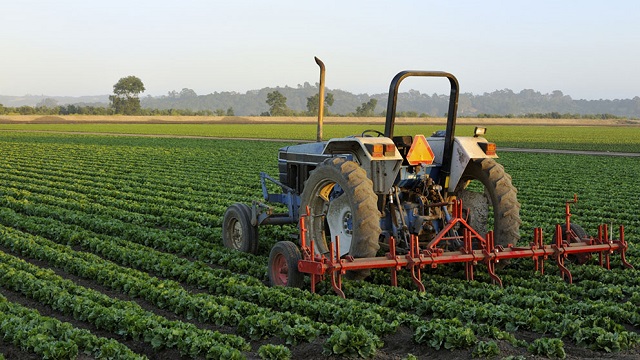Promote agribusiness to attain SDGs: Global Experts

Sifelani Tsiko in Victoria Falls
“Our slogan should be from a cotton field to a factory that produces a shirt, from animal leather to a shoe factory…from fruit to fruit juices and not to send your fruits only to import fruit juices,” says Mr Frederick Shava, permanent representative of Zimbabwe to the United Nations.
Mr Shava who is also the president of the Economic and Social Council (Ecosoc), the United Nations’ central platform for reflection, debate, and innovative thinking on sustainable development, says growing crops and exporting them in their raw form, without adding value will simply perpetuate poverty making it difficult for most developing countries to attain the Sustainable Development Goals (SDGs).
Speaking at a global experts meeting on agriculture and agro-industries development in Victoria Falls recently, Mr Shava said value addition, industrialisation and beneficiation can help create sustainable growth in agricultural industries that can provide opportunities for increasing economic benefits for the majority of smallholder farmers who are trapped in poverty.
Africa and most other developing countries, he says, need to take a broader approach to development that targets the entire market system – from crop production, processing and manufacturing to marketing and distribution.
“We are happy and proud that Zimbabwe can host such a high profile global meeting on agriculture and agribusiness. Zimbabwe is a peaceful country, it’s a good destination for investment, tourism and discussing ideas that can positively influence global debates on sustainable development,” says Mr Shava.
Zimbabwe is hosting the United Nations Economic and Social Council this week to find ways of strengthening innovations and investment in agriculture and agro-industries across all countries.
The country was chosen to lead the 54-nation Ecosoc at the 71st Session of the General Assembly last September.
Zimbabwe’s Ambassador to the UN, Mr Shava now heads Ecosoc after taking over from Oh Joon, an ambassador of South Korea.
The expert group meeting aims to maximise the participation of top policy and technical experts on agriculture and agro-industry from all countries, particularly African and the countries in special situations, as well as relevant representatives from non – state actors.
Recommendations and conclusions will inform the Ecosoc Special Meeting to be held at the UN headquarters in May 2017.
The expert group meeting on agriculture and agro-industry here in Victoria Falls is the second preparatory meeting focusing specifically on agriculture and agro-industry.
The first preparatory regional meeting on Infrastructure and Industrialisation in developing countries was held in Dakar, Senegal in March this year.
Smallholder farmers in Africa and most other developing countries are still mired in poverty and are unable to feed themselves owing to constraints they face in accessing inputs, farm technologies, extension services, finance, markets and beneficiation from value addition chains.
Global experts say to lift the farmers out of poverty, it is imperative to focus more on the two billion people who live and work on small farms in the developing world.
They say the best way to support these smallholders has less to do with things they can do to improve their farms but more to do with the systems in which they operate.
The experts were unanimous that farmers must be supported to access knowledge that enhances productivity inputs and tools.
To create sustainable growth in agricultural industries, that can provide opportunities for increasing economic benefits for farmers now and in the future, they say.
Governments, UN agencies, the private sector and all other key stakeholders need to take a broader approach to development that targets the entire market system.
Ms Carla Mucavi, director of the FAO Liaison Office in New York, who represented the director-general, Mr Jose Graziano da Silva, said agro-industry development was crucial in achieving several SDGs.
“Agro-industry development has strong multiplier effects as it can simultaneously generate decent jobs, increase profits and create markets for value-added food products. It will also be key in delivering safer, more affordable, reliable, convenient, and nutritious food to urban markets,” she said.
Experts at the Ecosoc meeting also say the transformation of the agricultural sector through agro-industries development is critical.
They say if the private and public sectors combine their respective strengths and responsibilities, agro-industry development will become one of the primary drivers for achieving the SDGs.
Emphasis on technology transfer, sustainable funding, together with good agriculture and manufacturing practices, can also accelerate countries’ poverty reduction and food security efforts, the experts say.
Speaking at the three-day meeting, Minister of Macro-Economic Planning and Investment Promotion Dr Obert Mpofu said agricultural development was essential to eliminating hunger and malnutrition.
“Higher agricultural productivity and more efficient markets for agricultural products reduce food prices, thereby enabling access to food for the poorest rural and urban dwellers,” said Dr Mpofu.
Other experts bemoaned the lack of political will, financing, support for research and development in agriculture, poor inter-Africa trade, over reliance on outdated approaches to development, lack of agricultural technologies and poor adoption of modern farm technologies.
The share of inter-Africa trade for agriculture and livestock products is 12 percent and 87 percent is from the rest of the world.
“We have to do more to increase the share of inter-Africa trade to develop our agro-industrial sector,” says Mr Julius Ecuru, a Kenyan-based value chain expert.
“In the European Union, the share of inter-trade is 60 percent and as Africa we need to improve this so that our farmers benefit more from value addition chains and increased business.”
Experts say too many agricultural development programmes focus on increased productivity without enough thought about how those products will be sold and processed competitively, through the business cycle.
Large-scale processors have dominated the agri-processing sector and experts say African governments need to push for the establishment of smaller, labour – intensive plants located near farming areas that could operate at a lower cost, produce a high-quality product and create jobs in rural communities.
This, they also say, could create a reliable local market for the farmers, who could be incentivised to improve the quality of their product.
“We have to have productive areas that generate jobs in Africa. Governments can’t create the jobs anymore. About 80 percent of jobs lie in agriculture and we need to take practical steps to lift our farmers out poverty by investing more in agriculture and agro-industrial development,” says Mr Gerardo Patacconi, acting director of agri-business development at UNIDO.
He says agribusiness promotion is key in the attainment of SDG 9 which focuses on the attainment of goals on value addition and job creation.
“About 40 percent of production from agriculture does not reach the consumer. We produce but at the end of the day the food does not reach the consumer. Postharvest losses are huge and we have to focus more on the big value that comes from processing and manufacturing and that’s where Africa should focus more.”
To develop agribusiness in developing countries, experts called for improved financing, profiling R & D and innovation, creation of an enabling policy for agriculture and agro sector, infrastructure development, collective action, improved support for small farmers, improved adoption of new technologies, revamping the regulatory environment and promoting cross-border linkages to link farmers into regional markets rather than relying on volatile global markets.
In addition, they say increased private sector involvement, provision of incentives, extension services, raising the profile of agriculture in the national psyche and allowing titles to land can also help drive agro-industrial development.
“Implementation is key. We must make sure we apply what we have learnt, what has worked and what is possible,” says Mr Augustine Wambo of NEPAD.
“We can’t afford to remain at the theoretical level but we have to move to a practical level.”
Adds Mr Jerome Afeikhena of FAO: “There is a lot about what needs to be done and less about the how. The devil is in the hows, of how things are done.”
However, Mr Shava remains optimistic: “I’m very optimistic about the outcome of the meeting here in Victoria Falls. Certainly, the recommendations will give a strong push for export-oriented agri-business, agro- beneficiation, value addition and for all strategies that will help lift our farmers out of poverty.” – Zimpapers Syndication.












Comments